Education is one of the most powerful drivers for economic development and social progress. Yet, across Latin America and the Caribbean (LAC), the region faces a severe education crisis and struggles with poor and even worsening learning outcomes. The recent London Business School Latin America Business Forum, organised by Latin America Club and Brazil Club February 2025, hosted Dr. Jaime Saavedra, Human Development Director for the Latin America and the Caribbean at the World Bank, he delivered a keynote speech addressing the scope of this challenge and potential solutions.
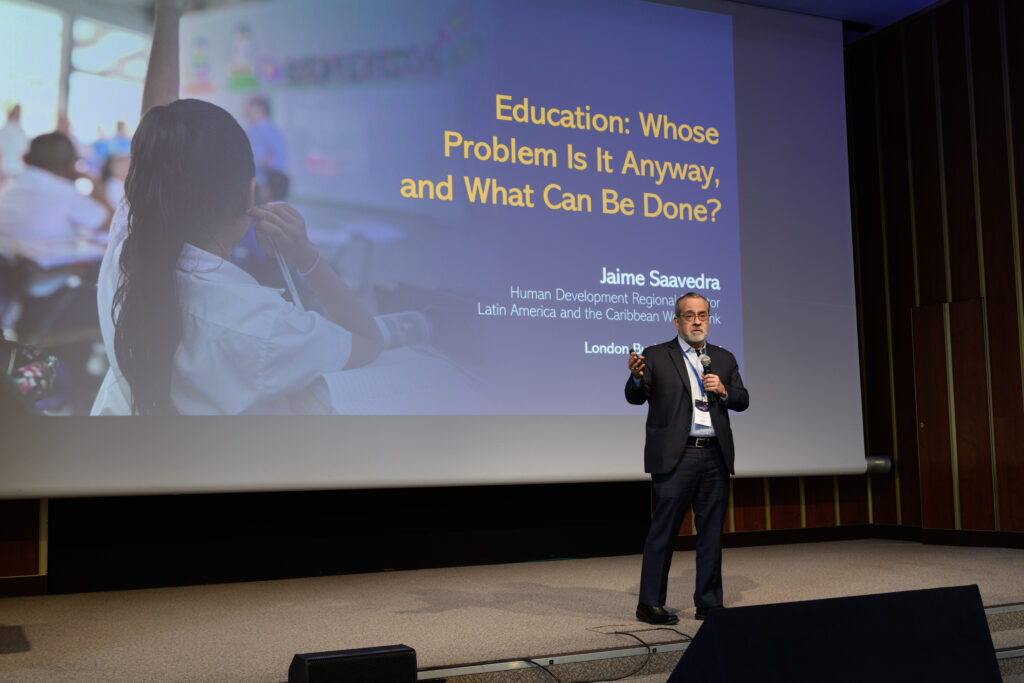
The Importance of Education in Economic Growth
With education and human development deeply intertwined with economic success, economists have recognised talent as a form of capital that enables a better future for individuals and for the society. Studies show that at the individual level, every additional year of education can increase earnings by 10% per year (Montenegro and Patrinos, 2023) and at the national level, three to four additional years of high-quality schooling can contribute to 2 percentage points increase in annual GDP per capital growth (Hanushek, Woessmann and Maximilian, 2021).
Whilst increasing access to education is a positive step forward, it’s not enough. Real change lies in the quality of education delivered. This is often overlooked but has a significant impact on individual and national economic outcomes. Study shows that improving learning quality has a far greater impact with 10-13% increase in GDP growth, whereas increasing education access can only yield a return of 3-4% GDP increase. (Hanushek, Woessmann and Maximilian, 2021)
Access to education is less of the issue for LAC countries, as the region already achieves above 90% enrolment rate for both primary and secondary education. (UNESCO UIS, 2024) But is the education working and achieving the expected learning outcomes?
The Education Crisis in Latin America
Despite the high enrolment rate in the LAC region, learning outcomes remain alarmingly low, as indicated by the World Bank’s learning poverty rate, which measures the percentage of 10-year-olds who cannot read or comprehend a simple text. In 2019,
- Less than 10% in high-income countries faced this challenge less than 5% in some OECD countries
- In LAC it was more than 50% (52%) of 10-year-olds that lacked basic literacy skills
After COVID-19 pandemic, with one of the world longest school closures and limited access to remote learning, LAC region saw worsening education crisis, with 2022 learning poverty rate estimated to be 79%. (OECD, 2023) Without urgent intervention, LAC region is not even close to meet the UN Sustainable Development Goal (SDG) of achieving universal quality primary and secondary education by 2030, or even just reduce learning poverty by half.
The crisis extends to secondary education as well. The recent results of Program for International Student Assessment (PISA) showed a wide gap in learning outcomes between OECD and LAC students, with only 25% of LAC 15-year-old students have above-basic proficiency in math compared to 69% for OECD countries. For mathematics, the shortfall in scores of an average LAC student compared to the OECD counterpart is equivalent to five years of schooling (OECD, 2023)
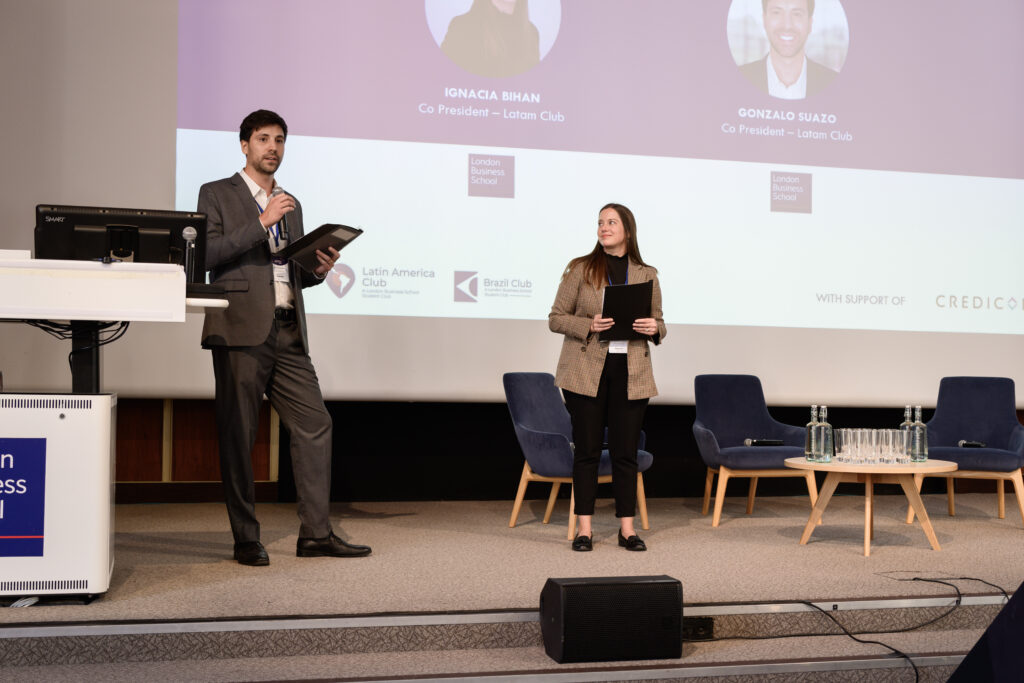
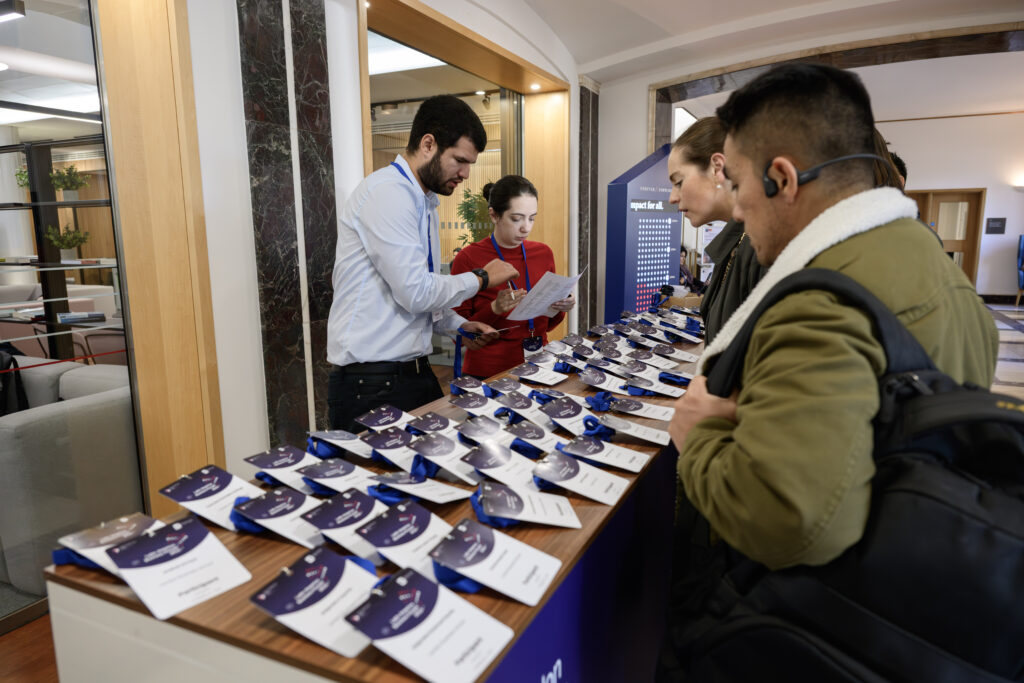
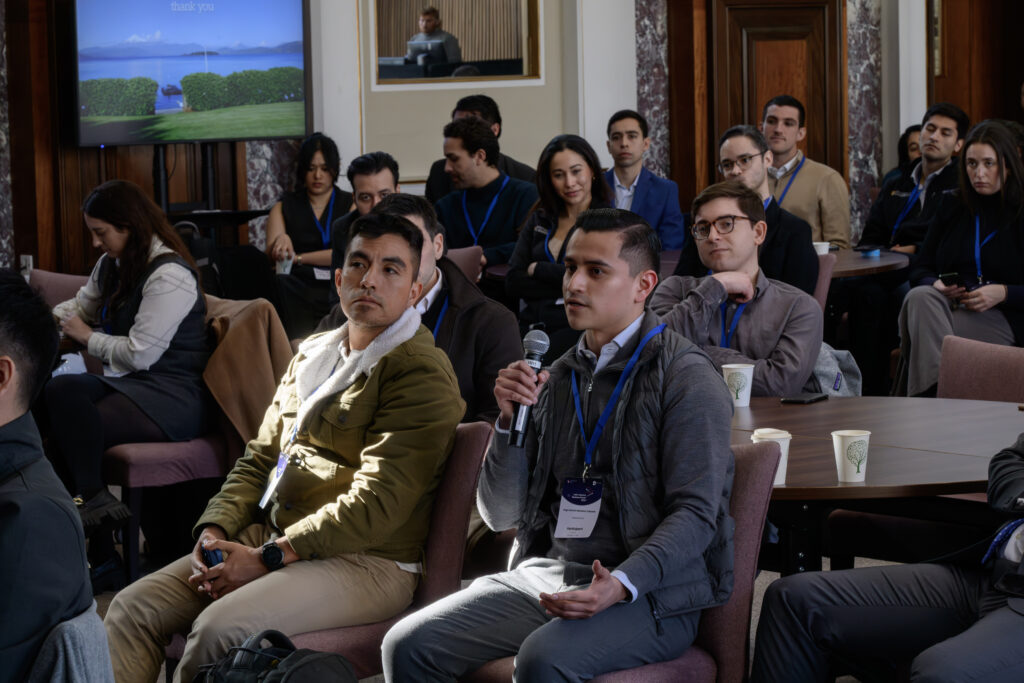
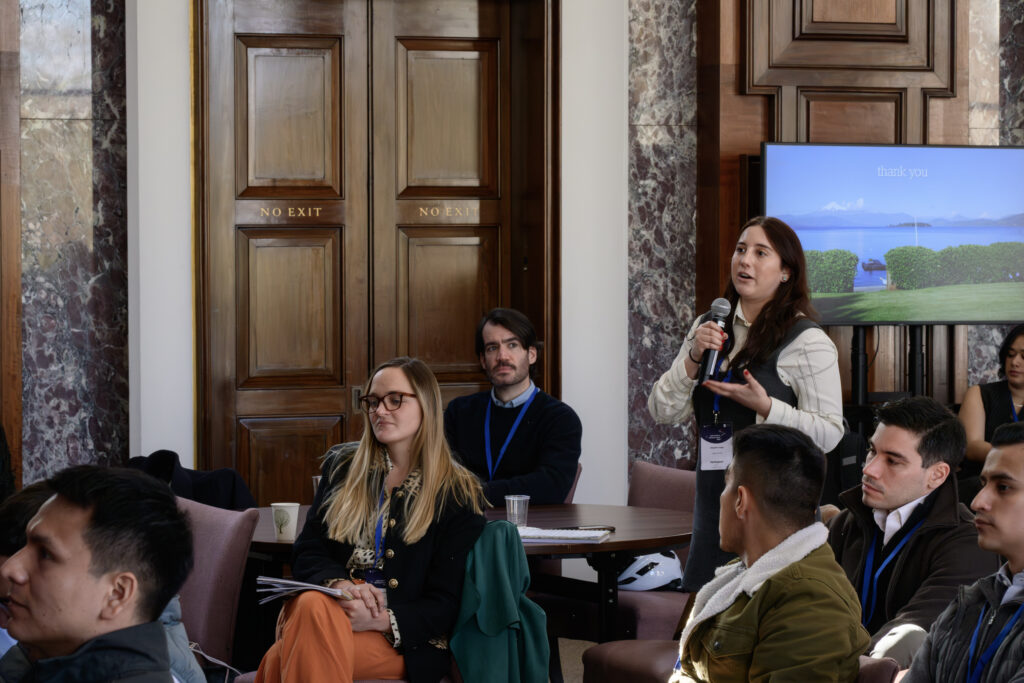
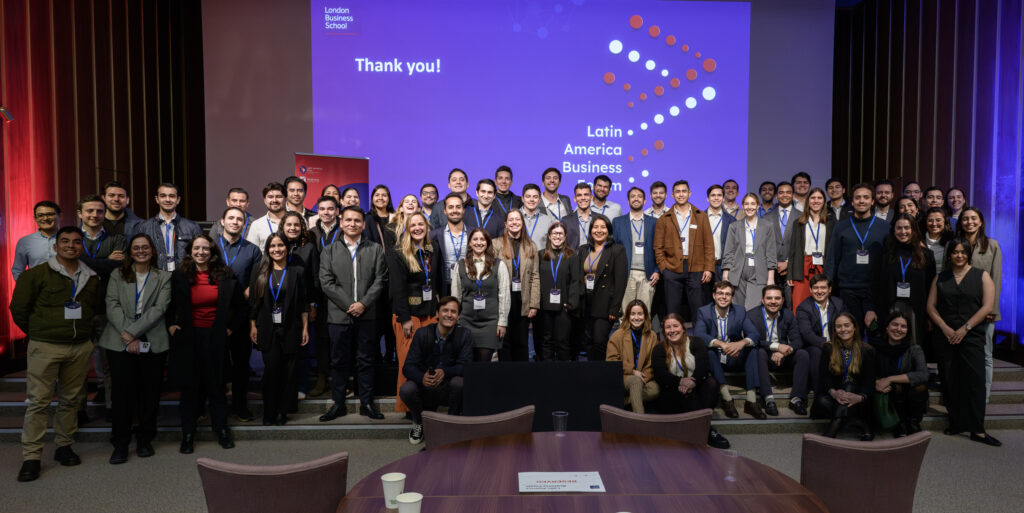
Another striking aspect of education in LAC is the division between public and private schooling. While parents in developed countries have strong trust the quality of public education, in LAC, over 80% of the wealthiest households enrol their children in private schools, further deepening social segregation (De La O., Rossel and Manzi, 2023). Moreover, policymakers seemingly have not internalised the magnitude of the problem, as 80% of government officials in LAC underestimate the scale of the learning crisis, leading to a lack of urgency in reform efforts. (Crawfurd et al., 2021)
The implications of the education crisis on LAC’s workforce and economic growth prospect are concerning. Poor learning outcomes led to an uncompetitive workforce with low literacy level. In Peru and Ecuador, more than 30% of workers lack primary skills in reading, compared to only 5% in OECD countries. (OECD, 2019) When looking at the level of basic technology skills, such as the capacity to use a mouse or scroll through a webpage, LAC’s workforce is not ready for the digital world, with more than 30% of adults in Peru, Ecuador and Mexico lack basic technology skills compared to only 16% in OECD countries. (OECD, 2019) It is apparent that education reforms are needed to help LAC workforce adapt to the modern economy and compete globally.
Reforming Education: What can be done?
Dr. Saavedra emphasised that to address the education crisis, a fundamental shift toward learning-focused reforms imperative. “Isomorphic mimicry” in LAC education, as referred by Dr. Saavedra, is creating an illusion as even children in the region are in school, learning is not necessarily taking place. A reform process focused on learning needs to happen at scale to change the experience of students, while recognises the implied implementation challenges, and improves public systems. To achieve such reform, Dr. Saavedra proposed four key areas:
- Improve the social status of teachers, by making selection and promotion meritocratic, attracting the best talent into the profession, rewarding teachers with competitive compensation
- Enhance the quality of learning by revising the curriculum, providing direct pedagogical support to schools, carrying out institutional reforms to university system
- Implement effective education management at both school and system level, introduce data-driven learning planning and assessment, increase the accountability for learning outcomes
- Close the infrastructure gap with sustainable and innovative infrastructure investments tailored to the needs of regions with private sector partnerships.
Yet achieving education reform at scale requires action on multiple fronts. For the public sector, changes at scale require technical education design, implementation capacity, strong political and financial commitment. While LAC countries are already investing in education, there are opportunities to strengthen the quality of bureaucracy to improve the effectiveness of education investment. For example, while Argentina and Turkey have similar cumulative expenditures per student of USD 45,000, students in Turkey achieve better academic performance, equivalent to two additional years of education ahead of their peers in Argentina. (OECD, 2023)
The private sector and civil society also play a critical role in driving education reform, from supporting a school to supporting the system. Apart from leading school level support programs through foundations and CSR initiatives, private sector is advocating public policy through forming and financing civil organisations, such as Argentinos por la Educacion, Mexicanos Primero, Fundacion Empresarios por la Educacion. Private sector can also support public sector implantation capacity at scale. For example, Brazil’s Lemann foundation and Peru’s Antamina are working with the local bureaucracy and implementing community education programs.
As Dr. Saavedra concluded his speech, he returned to the central question, whose problem is it anyway? The answer is clear, education is everyone’s responsibility. It is a challenge that demands collective action from the public sector, private sector, and civil society.
The education crisis in LAC cannot be ignored, and efforts to reform and improve learning outcomes must happen now. Every child in the region deserves a quality education and ensuring this should be a shared commitment before it is too late.
About the speaker

Dr. Jaime Saavedra is the Director of Human Development for Latin America and the Caribbean at the World Bank, previously he was the Lead of Global Education Practice, Global Director for Poverty Reduction and Equity and Acting Vice-President of Poverty Reduction and Economic Management. He led efforts to advance education, health, and social protection policies, shaping strategies to improve learning outcomes, workforce skills, and human capital development across Latin America.
Before joining the World Bank, he served as Minister of Education of Peru between 2013 and 2016. He led major education reforms focused on teacher quality, curriculum modernization, and infrastructure expansion. He has also held positions at the Inter-American Development Bank, the Economic Commission for Latin America and the Caribbean, the International Labour Organization, LACEA, and the National Council of Labour in Peru. the Group for the Analysis of Development (GRADE).
Dr. Saavedra has published extensively on education policy, labour economics, and inequality. His recent work addresses learning recovery post-COVID-19 and the role of education in economic development. He holds a Ph.D. in economics from Columbia University and a B.A. in economics from the Pontificia Universidad Católica del Perú.
About the organisers
The Latin America Business Forum 2025, held at London Business School brought together leaders, change-makers and young professional to discuss the challenges and opportunities shaping Latin America’s future. Organised by the LATAM and Brazil Club, including LATAM club presidents: Maria Ignacia Bihan, MBA 2025 and Gonzalo Suazo MBA 2025 and forum senior coordinators: Maria Jose Ibarguengoitia MBA 2025, and Santiago Galleno MBA 2025, the event focused on key regional challenges and opportunities. Attendees engaged in inspiring panels, and meaningful networking, contributing to conversations on the region’s potential and the people driving change.
About the author

Luise Lin is an MBA 2026 candidate at London Business School and an Outreach and Communication Intern at the Wheeler Institute for Business and Development. Prior to joining London Business School, she worked at Boston Consulting Group as Consultant in Australia, where she advised clients across private and public sectors as well as social enterprises. Luise is passionate about leveraging managerial science, innovative business models, and financial solutions to drive scalable economic development impact in developing regions. She is particularly interested in the intersections of management, policy and social impact, exploring how private sector solutions can contribute to sustainable development.
Reference:
- Montenegro, C.E. and Patrinos, H.A. (2023) ‘A data set of comparable estimates of the private rate of return to schooling in the world, 1970–2014’, International Journal of Manpower, 44(6), pp. 1248-1268. Available at: https://doi.org/10.1108/IJM-03-2021-0184
- Hanushek, E.A., Woessmann, L. and Maximilian, L. (2021) ‘Education and economic growth’. Oxford Research Encyclopedia of Economics and Finance. Available at: https://hanushek.stanford.edu/sites/default/files/publications/Hanushek%2BWoessmann%202021%20OxfResEncEcoFin.pdf
- UNESCO Institute for Statistics (UIS) (2024) ‘School enrollment (% gross) – Latin America & Caribbean’. World Bank Data. Available at: https://data.worldbank.org/indicator/SE.SEC.ENRR?locations=ZJ
- OECD (2023) PISA 2022 Results: The state of learning and equity in education. Available at: https://www.oecd.org/content/dam/oecd/en/publications/reports/2023/12/pisa-2022-results-volume-i_76772a36/53f23881-en.pdf
- De La O., A., Rossel, C. and Manzi, J. (2023) Opting out from public services and the social contract in Latin America. Inter-American Development Bank (IDB). Available at: https://publications.iadb.org/en/publications/english/viewer/Opting-Out-from-Public-Services-and-the-Social-Contract-in-Latin-America.pdf
- Crawfurd, L., Hares, S., Minardi, A. and Sandefur, J. (2021) Understanding education policy preferences: Survey experiments with policymakers in 35 developing countries. Center for Global Development (CGD). Available at: https://www.cgdev.org/publication/understanding-education-policy-preferences-survey-experiments-policymakers-35-developing
- OECD (2019) Skills Matter: Additional Results from the Survey of Adult Skills, OECD Skills Studies. OECD Publishing, Paris. Available at: https://doi.org/10.1787/1f029d8f-en
- OECD (2019) OECD skills outlook 2019: Thriving in a digital world. Paris: OECD Publishing. Available at: https://www.oecd.org/en/publications/2019/05/oecd-skills-outlook-2019_c8896fe0.html
- OECD (2023) PISA 2022 insights and interpretations. Paris: OECD Publishing. Available at: https://www.hm.ee/sites/default/files/documents/2023-12/PISA%202022%20Insights%20and%20Interpretations_OECD.pdf
